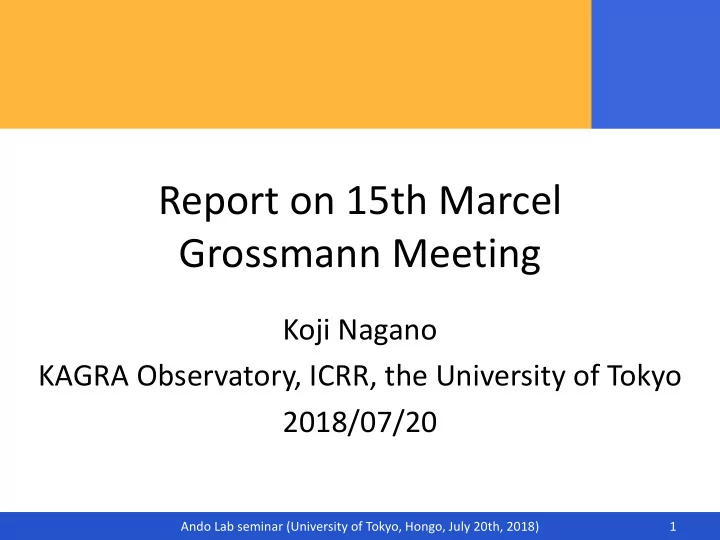

Report on 15th Marcel Grossmann Meeting Koji Nagano KAGRA Observatory, ICRR, the University of Tokyo 2018/07/20 Ando Lab seminar (University of Tokyo, Hongo, July 20th, 2018) 1
Outline 1. MG15 2. Report Ando Lab seminar (University of Tokyo, Hongo, July 20th, 2018) 2
MG15 Ando Lab seminar (University of Tokyo, Hongo, July 20th, 2018) 3
MG15 Ando Lab seminar (University of Tokyo, Hongo, July 20th, 2018) 4
Review 1. General report 2. Entanglement of Quantum Clocks Through Gravity Ando Lab seminar (University of Tokyo, Hongo, July 20th, 2018) 5
Review 1. General report 2. Entanglement of Quantum Clocks Through Gravity Ando Lab seminar (University of Tokyo, Hongo, July 20th, 2018) 6
General review • Schedule – 2 nd -7 th July, 2018 – Morning: Plenary talks – Evening: Parallel session • There were many theoretical talks. (>2/3?) – In plenary talks, more experimental talks. • Parallel sessions were really parallel. – There were about 20 sessions in parallel. • Many works told in parallel sessions were a kind of review of what has been published in journal paper. Ando Lab seminar (University of Tokyo, Hongo, July 20th, 2018) 7
Review 1. General report 2. Entanglement of Quantum Clocks Through Gravity Ando Lab seminar (University of Tokyo, Hongo, July 20th, 2018) 8
Abstract • This talk was in Precision Tests session (PT3). Ando Lab seminar (University of Tokyo, Hongo, July 20th, 2018) 9
Abstract • In general relativity, the picture of space–time assigns an ideal clock to each world line. Being ideal, gravitational effects due to these clocks are ignored and the flow of time according to one clock is not affected by the presence of clocks along nearby world lines. • However, if time is defined operationally, as a pointer position of a physical clock that obeys the principles of general relativity and quantum mechanics, such a picture is, at most, a convenient fiction. Ando Lab seminar (University of Tokyo, Hongo, July 20th, 2018) 10
Abstract • Specifically, we show that the general relativistic mass– energy equivalence implies gravitational interaction between the clocks, whereas the quantum mechanical superposition of energy eigenstates leads to a nonfixed metric background. • Based only on the assumption that both principles hold in this situation, we show that the clocks necessarily get entangled through time dilation effect, which eventually leads to a loss of coherence of a single clock. • Hence, the time as measured by a single clock is not well defined. However, the general relativistic notion of time is recovered in the classical limit of clocks. Ando Lab seminar (University of Tokyo, Hongo, July 20th, 2018) 11
Clock • In this paper, two-level systems are used as clocks. • The systems are initially in superposition. Then, it will be orthogonalized in t ⊥ = . • t ⊥ quantifies the precision of the clock, and it is, in this sense, a measure of time uncertainty. |1> (=E 1 ) ΔE = E 1 – E 0 |0> (=E 0 =0) Ando Lab seminar (University of Tokyo, Hongo, July 20th, 2018) 12
Time dilation • In general relativity, energy is equivalent to mass, E = mc 2 . • Thus, the different energy level has the different mass. • When we consider general relativity, the clock close to the two-level system is affected differently according to its energy level. m 1 |1> (=E 1 ) Δ t Clock Gravity ΔE = E 1 – E 0 No dilation m 0 =0 |0> (=E 0 =0) Ando Lab seminar (University of Tokyo, Hongo, July 20th, 2018) 13
Time dilation • The other clock is also the two-level system. |1> (=E 1 ) |1> (=E 1 ) Δ t Gravity ΔE = E 1 – E 0 ΔE = E 1 – E 0 No dilation |0> (=E 0 =0) |0> (=E 0 =0) Ando Lab seminar (University of Tokyo, Hongo, July 20th, 2018) 14
Time dilation • The other clock is also the two-level system. • In this situation, the clocks affect each other. |1> (=E 1 ) |1> (=E 1 ) Gravity ΔE = E 1 – E 0 ΔE = E 1 – E 0 |0> (=E 0 =0) |0> (=E 0 =0) Ando Lab seminar (University of Tokyo, Hongo, July 20th, 2018) 15
Time dilation • The other clock is also the two-level system. • In this situation, the clocks affect each other. • As a result, the two clocks gets to be entangled via gravity. Entangle |1> (=E 1 ) |1> (=E 1 ) Gravity ΔE = E 1 – E 0 ΔE = E 1 – E 0 |0> (=E 0 =0) |0> (=E 0 =0) Ando Lab seminar (University of Tokyo, Hongo, July 20th, 2018) 16
Time uncertainty • As a consequence of these considerations, there is a fundamental trade-off between the accuracy of measuring time at the location of the clock and the uncertainty of time dilation at nearby points. • This uncertainty relation that arises due to both quantum mechanical and general relativistic effects . Ando Lab seminar (University of Tokyo, Hongo, July 20th, 2018) 17
Recommend
More recommend